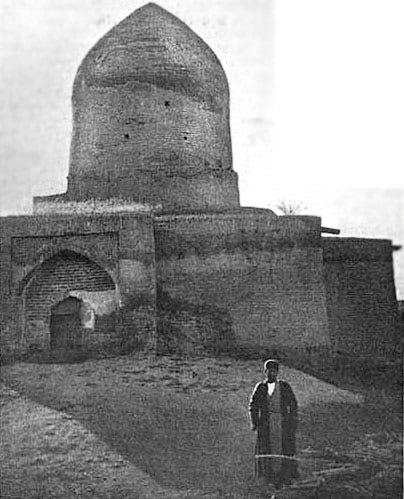The End of Esther’s Exile:
A Reflection on Persian Jewry in the Year 5785
(The Tomb of Esther and Mordechai in Hamadan, Iran)
I am the luckiest Jewish educator whoever lived.
The Yeshiva I taught in was half Ashkenazi and half Sephardic, mostly Persian.
Another way of saying this is that I taught in one of the first mixed Ashkenazi/Persian Yeshivas in world history.
The gravity of that did not strike me until one of my Persian students casually remarked that, before fleeing, his family had lived in Persia since the time of Mordechai and Esther.
As an Ashkenazi Jew, this idea was almost impossible to believe.
Before coming to the United States, my ancestors lived in what was then called the Russian Empire, before that the Austro-Hungarian Empire, before that a loose confederation of slavic states in the pale, before that, who knows.
For simplicity’s sake, we just called all of those places “Poland.”
But, as my student and the rest of the Persian cohort explained, Los Angeles was only the third destination in their family's personal diaspora, maybe the fourth if their parents lived on Long Island for a little while.
They lived in Los Angeles, their ancestors lived in Persia, and, before that, they lived in the Davidic Kingdom of Ancient Israel.
And here they were, after all that time, sitting in my classroom.
The rabbis teach us that the reason the Jews were sent into exile the second time was because of Sinat Hinam, baseless hatred among Jews, among friends, among family.
During the Roman period, Jews were so petty with each other that they let silly things like differences in religious interpretation or political beliefs interfere with their human relationships.
At the time, it was the Sadducees and the Pharisees, two groups of Jews living in Israel with different interpretations of what it meant to be a righteous Jew.
They were so divided over their petty squabbles that the Roman Empire was able to divide the nation, destroy the temple, and desecrate the land.
Sinat Hinam is bad.
It is probably my number one concern.
But my students taught me that there is another way to live.
I will be the first to admit that, growing up in a community that was divided between Ashkenazi and Persian families, I spoke ill of Persian culture when I was younger.
I didn’t understand it, it was foreign to me, and I let myself indulge in the pleasure of hating on that which I did not understand.
The classic, quintessential, difference between Persian and Ashkenazi Jews is our understanding of time.
Ashkenazi Jews drank Prussian air for many generations, and we tend to follow the Prussian military precision when it comes to timing.
Persian Jews, on the other hand, tend to show up to events, well, late.
Now, that could be a point of fission and a point of complaint, as it was for me when I was growing up.
Or, it could be a point of fusion and a point of joy.
I had a student, bless his heart, who had failed his driver's license test three times. Before his fourth attempt, he asked me for a blessing that he might pass this time.
When he returned to class the next day, beaming with pride, I knew that driving in that neighborhood would never be safe again.
“Mr. Goldstein,” he said, “I finally figured it out.”
“You see,” he explained, “going to the DMV is like going to a mixed Persian/Ashkenaz wedding… you have to make an appointment and show up on time, but then you still have to wait three hours before anything happens.”
The whole class burst into laughter, Persians and Ashkenazim alike.
But, in that one little joke, I believe lies the secret to our future success.
There are many right ways to be Jewish – in fact, there are just as many right ways to be Jewish as there are Jews in the world.
And some of the ways that other people live Jewishly are, let’s face it, funny. Or curious, or strange, or whatever.
Newsflash – some of the ways that you live Jewishly are funny.
Rather than judge what we do not understand, or criticize that which is foreign to us, why don’t we try to love it, the way my students did.
One of my fondest memories from teaching at the Yeshiva was when my students taught me how to wrap my Tefillin.
First of all, when I asked them for help, I was a little nervous. As a young teacher who is close to his students in age, it can be hard to maintain enough of the students’ respect to maintain your authority.
I was worried that telling them I didn’t know how to do something they had been doing since they were 13 would lower me in their eyes.
But it was the opposite.
As soon as I asked for help, they all jumped up to help me. No one said anything disparaging, or discouraging, or belittling – all of them were extremely supportive and excited to help me perform a Mitzvah.
But two of my students, one Ashkenaz one Persian, were perpetually competing with one another, and this was no different.
The Ashkenazi student showed me how to wrap the Tefillin around my arm, at which point, the Persian said, “Ok, now you’re going to want to sit down for this next part.”
The Ashkenazi student, outraged, started shouting in a combination of English, Hebrew, and Yiddish.
What he said, I will never understand, but, the gist of it was, “bro, he’s ashkenazi… Ashkenazim don’t sit when we put on head Tefillin, that’s only a Sephardic thing.”
The Persian student, realizing this, said, “oh, that’s right. Ok, Mr. Goldstein, I can’t help you anymore,” and he walked away.
The reason I love this story so much is because I think about it every time I put on my head Tefillin.
I think to myself, “why, why would I want to sit down for this part? Is there something the Sephardim know that I don’t?”
And that is the most beautiful part of being Jewish in 2024, 5785.
We are living in the twilight of exile.
Every living Jew is the inheritor of thousands of years of tradition.
Our people, our faith, our family has spread out across the world, lived in every country, felt every season, and now we are here, in this moment, the first moment since the beginning of time when we can come together and share with each other what we have learned.
Not because we wish to compete.
Not because we wish to prove that our way was right.
Not because we wish to do anything.
Simply because we have yearned to be together for so long, and now we are.
Since the founding of the State of Israel, G-d has been gathering in his Jewish exiles.
Jewish communities previously unknown to the outside world found their way back home.
I would joke with my students that I knew exactly what the Messianic Era would look like.
I would tell them that the Messiah is going to build a tent, a huge tent, big enough to fit all of the Jews of the world. And, inside that tent, there would be places for learning, places for playing, places for raising kids, and, of course, there would be food. Lots and lots of food.
And in that tent, I said, the Persians Jews would make Tadiq and Kebab, the Sephardic Jews would made Shwarma and falafel, the Ashkenazi Jews would make Rugalach and Babka, and the Ethiopian Jews would make the coffee.
That is the world I want to live in, a world without exile.
And now, in 2024, almost every Jewish community of exiles has been liberated.
But not the Persian Jews still living in Persia.
There are still about 8000 Jews living in Iran under the yoke of the Ayatollah.
“But don’t worry about them,” one of my students said, “as long as Mordechai and Esther are still there, they’ll protect them.”
Mordechai and Ester, the real victims of the Purim story.
Despite all of the joy and celebration of Purim, the story ends with Esther still in Persia, still living with the King, still not returning to Israel.
And, every Purim for the past 2500 years, Ester has remained in her Persian exile, steadfastly watching over the Jews who remain.
Esther is really the archetypal badass Jewish woman. Every Jewish woman has some of Esther in her, but Persian women got a double dose.
There are very few people who are as dedicated and dogged servants of G-d, His Torah, and His people, than Persian women.
When I was a child, maybe 6 or 7 years old, I went to the Simchat Torah celebration at Shul with my dad. I was dancing with a child-sized Torah, carrying it around the community.
An older Persian woman, who spoke no English, came up to me and hugged me, the Torah clutched between us.
And she held me for a long time, just sobbing.
Sobbing with 2500 years of pain and joy.
This Simchat Torah, I got to see an older Persian woman carry the Torah herself. She held it like a child, showering it with kisses like a grandmother kissing her grandchild behind the ear.
That woman, that very same woman, had told me a story about how she had escaped from Iran.
With a thick Persian accent, she told me that she was a singer, and she was able to make extra money because of how well she could sing from the Koran. She was the best Koran chanter in her community
“But as soon as I come to United States,” she said with her thick accent, “I started davening.”
And a smile crept over her face like the crescent moon.
She told me that nothing made her happier than finally getting to use her voice to sing to G-d in Hebrew, but her voice was shot now so she didn’t sing anymore.
That made me sad.
But, on Simchat Torah, when the leader was asking for volunteers to chant some of the prayers, she stood up and sang for us, and it was like hearing a voice coming to you from outside of eternity.
And at more or less that same moment, four Israeli women were flying into Iranian airspace to strike back at the modern-day Haman.
Exactly one Hebrew year after the Iranian Amalekites tried to decree that the Jewish people should be wiped out.
When I saw the pictures of those Israeli women flying into Iran, I did not see F-16s and flight suits – I saw Esther, dressed in her royal robes, running through the palace halls to plead with the king for the sake of the innocent.
Esther’s heroism, the heroism of Jewish women, has protected the Jews of Persia for 2500 years.
Now, it is up to us to figure out how to carry on her legacy, to liberate the last of the exiles in Iran, and to bring Esther home.
For 2500 years she has been in exile with the Persian community, but that exile will not last for much longer.
Spread Love, Spread Light,
Am Yisrael Chai
~
Thank you so much for reading The Zionist Voice.
If you would like to support us, the best thing that you can do is subscribe and spread the word to your friends.
With your help, we will return this world back to reason.
Thank you so much for your support.






Absolutely fantastic article
That hit the spot 🖖🙌🖖